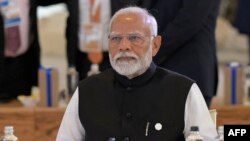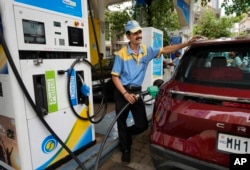Indian Prime Minister Narendra Modi arrived in Russia Monday for a two-day visit to shore up relations at a time that Moscow has deepened ties with New Delhi’s archrival, China.
New Delhi analysts say the summit meeting with Russian President Vladimir Putin set for Tuesday will help counter perceptions of a drift in ties with its longtime ally as India builds a closer partnership with the United States.
“India’s goal is to emphasize that India-Russia relations are important and to ensure that Putin’s growing relations with China will not affect ties with New Delhi,” Chintamani Mahapatra, founder of the Kalinga Institute of Indo Pacific Studies told VOA.
“That is why it is extremely important to continue the dialogue with Russia at the highest level,” he added.
The summit will be the first since Russia invaded Ukraine, an issue on which New Delhi has maintained a neutral stance; It has neither condemned the war nor joined Western sanctions imposed on Moscow.
Although Indian and Russian leaders have held annual summits since 2000, none have been held since Putin visited New Delhi in 2021.
Calling the summit “something waiting to happen,” Indian Foreign Minister Subrahmanyam Jaishankar stressed the two countries’ “strong history of working together.”
The focus of Modi’s first visit to Russia in five years will be reinforcing a time-tested relationship, analysts say.
“I don’t think this will set the course for a future-oriented or path breaking partnership with a lot of new initiatives and deliverables,” Sreeram Chaulia, dean at the Jindal School of International Affairs told VOA.
“Rather,” he said, “it is to sustain the relationship, maintain the existing links we have and ensure how to keep our defense and energy cooperation on track.”
Despite diversifying its purchases of military hardware in recent years, India remains reliant on Russian arms – about one-third of India’s defense imports come from Moscow, down from two-thirds five years ago. Concerns have been growing though, since the Ukraine invasion began, about Russia’s ability to supply spare parts and ammunition.
Meanwhile, bilateral energy trade has boomed as India increases purchases of cheap Russian oil in the aftermath of the Ukraine invasion. However, while Moscow’s total exports to India are $65 billion, Indian exports are only about $4 billion, causing concern in New Delhi.
"Trade remains imbalanced, which is a matter of priority in our discussions with the Russian side," Indian Foreign Secretary Vinay Kwatra told reporters while announcing Modi's visit on Friday. He said India wants to promote exports across various sectors, including farm products, technology, pharmaceuticals and services to lower the deficit.
For Putin, the visit will be important in underscoring that he has not been isolated by Western sanctions, according to analysts. Some ot them have pointed to the optics of his meeting with Modi, which takes place even as a NATO summit focused on security concerns in Ukraine and the Indo-Pacific region gets underway in Washington on Tuesday.
Russia is expecting a "very important and full-fledged visit" by Prime Minister Modi, “which is so crucial for Russian-Indian relations,” Kremlin Spokesman Dmitry Peskov was quoted as saying on Saturday by Russia’s Tass news agency.
Analysts in New Delhi said Modi’s visit is unlikely to raise concerns in Washington, with which India has been deepening its security partnership amid mutual concerns about China’s assertiveness in the Indo-Pacific. So far India has managed to walk a fine line between the United States and Russia, according to Mahapatra.
The United States has "some concerns" over India's engagement with Russia in military and technology matters, but Washington has confidence and trust in New Delhi to advance the U.S.-Indian partnership in key areas, U.S. Deputy Secretary of State Kurt Campbell said at a virtual briefing on June 26 before the India-Moscow summit was announced.
Analysts in New Delhi say that while India has substantially strengthened its U.S. ties, its hostile neighborhood makes Russia important in its geostrategic calculations.
A four-year military standoff between India and China along their disputed borders that shows no signs of ending remains a worry for New Delhi.
“It is important for India that in the event of any India-China conflict, Russia will not side with China,” Mahapatra said. “That will only happen if Russia thinks India is an important country in their geopolitical calculations.”
However, it will be challenging for India to counterbalance China due to Russia’s huge dependence on Beijing in the wake of its isolation by Western countries. During a Putin’s May visit to China, the two countries pledged to intensify their partnership, which has burgeoned since the Ukraine war began.
“We are conscious that for Russia, China will remain its dominant ally, but India wants to make sure that it does not become completely predominant,” according to Chaulia. “We don’t want Russia to become a junior partner of China because then we will be surrounded by adversaries in the whole Eurasian region. So it is in our interest to make Russia stable in whatever way we can.”
After Moscow, Modi will go to Austria, the first visit by an Indian prime minister in over four decades.





